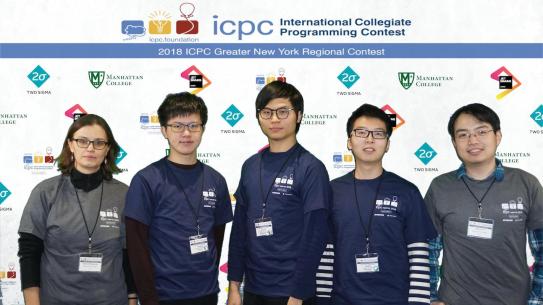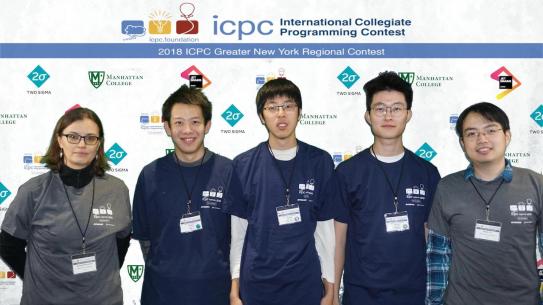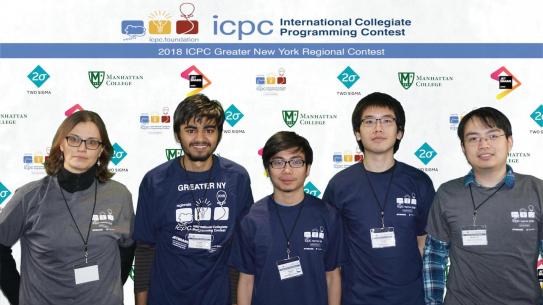NYU Teams Show Violet Pride at the ACM’s International Collegiate Programming Contest

The HuaNong Brothers team placed 8th at the 2018 ICPC New York Regional Collegiate Programming Contest
Back in 2014, Bowen Yu was a member of Bagel Flavored Debugging, a team comprised of NYU students who took part in the Association for Computing Machinery’s annual International Collegiate Programming Contest. That year, the creatively named team got the chance to represent the school at the global finals in Yekaterinburg, Russia, and there they were crowned North America champions. Because of age restrictions, Yu was unable to compete in subsequent years, but he did the next best thing: became a team coach.
At the 2018 New York Regionals, held in late November, NYU fielded four teams — the A Team, Too Young, Small Transparent, and the HuaNong Brothers — and while perhaps none were as fancifully named as the “Debuggers,” they each acquitted themselves admirably, landing in the top 20 out of nearly 60 teams.
“It’s unusual for every team representing a school to do that well consistently,” Yu, now a Ph.D. student, explained. “Generally you’ll have at least some beginners in the field of competitive programming who don’t land as far up in the rankings, but everyone from NYU performed at a high caliber.” Small Transparent and the HuaNong Brothers did particularly well, both cracking the top 10, while Too Young landed in a respectable 12th place, and the A Team came in not far behind at 18.
It is also notable, Yu explains, that so many NYU students are deeply interested in taking part in the competition, which requires grueling preparation. Drawn predominately from Tandon and Courant, the group meets weekly for intense practice sessions. “On a Friday night, when almost everyone you know is going out to party or staying in to relax, it takes a special person to be willing to sit for hours and code,” Yu, who teaches a special-topics course, Algorithmic Problem Solving, admits.
Still, he says, preparing for the competition is a great way to prepare for the job interviews that will inevitably follow graduation. “There’s a fixed fundamental set of solutions we use in working on competition problems, and any employer interviewing a programmer is going to draw from the same material,” Yu says. “If you are good at the competition, you’ll be good at interviewing — or at least those portions of the interview that concern your problem-solving ability.”






